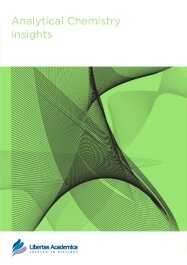

Publication Date: 24 Jan 2011
Type: Original Research
Journal: Analytical Chemistry Insights
Citation: Analytical Chemistry Insights 2011:6 1–6

A novel and sensitive floatation-spectrophotometric method is presented for determination of trace amounts of thorium in water samples. The method is based on the ion-associated formation between thorium, Eriochrome cyanine R and Brij-35 at pH = 4 media. The complex was floated in the interface of the aqueous phase and n-hexane by vigorous shaking. After removing the aqueous phase the floated particles were dissolved in methanol and the absorbance was measured at 607 nm. The influence of different important parameters such as Eriochrome cyanine R and surfactants concentration, pH, volume of n-hexane, standing time and interfering ions were evaluated. Under optimized conditions the calibration graph was linear in the range of 6–230 ng mL-1 of thorium with a correlation coefficient of 0.9985. The limit of detections (LOD), based on signal to noise ratio (S/N) of 3 was 1.7 ng mL-1. The relative standard deviations for determination of 150 and 30 ng ml-1 of thorium were 3.26 and 4.41%, respectively (n = 10). The method showed a good linearity, recoveries, as well as some advantages such as sensitivity, simplicity, affordability and a high feasibility. The method was successfully applied to determine thorium in different water and urine samples.
PDF (556.76 KB PDF FORMAT)
RIS citation (ENDNOTE, REFERENCE MANAGER, PROCITE, REFWORKS)
BibTex citation (BIBDESK, LATEX)
XML
PMC HTML


I have published more than thirty research papers in internationally reputed high impact factor journals including Libertas Academica publications, Proteomics Insights and Analytical Chemistry Insights. I have no hesitation in saying that Proteomics Insights is highly efficient for its rapid and high quality review process and keeping the authors informed at each stage of the publication process. I recommend this journal for students, teachers and research workers who wish to publish their work. ...
Facebook Google+ Twitter
Pinterest Tumblr YouTube